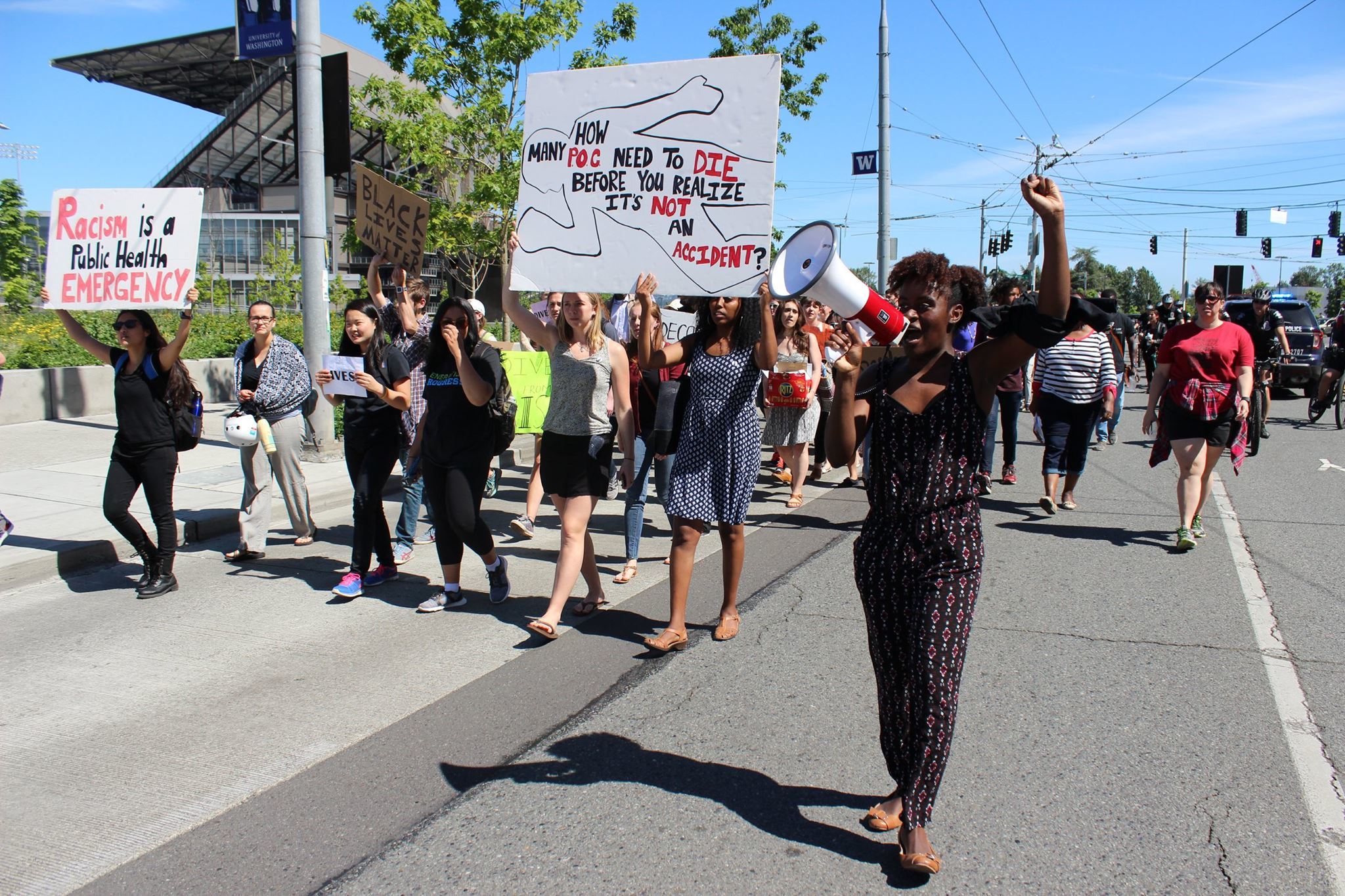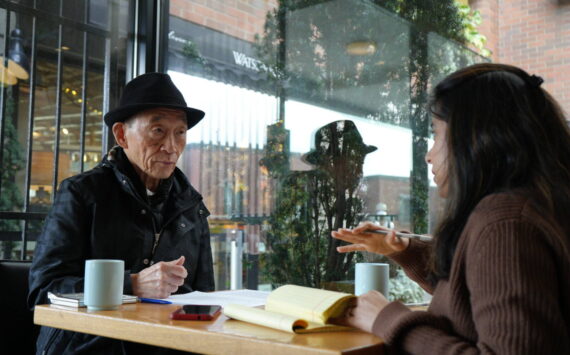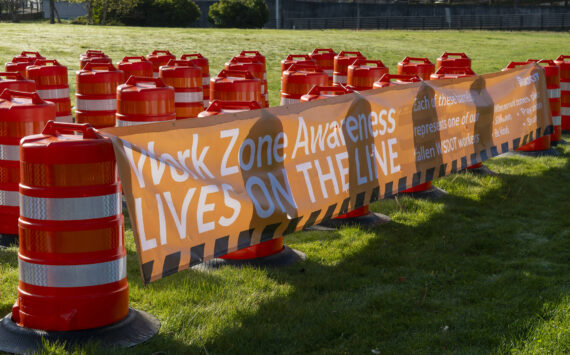On Thursday, the “Decolonize UW” protest took over the University of Washington campus as students, faculty, staff, and allies launched a dramatic redux of last year’s Black Lives Matter protest. It took over streets, blocked intersections, interrupted a Board of Regents meeting, lasted hours, and corralled hundreds, with participants chanting “No justice, no peace” and hoisting signs featuring slogans like “No Action, No Trust, Words Are Not Enough.”
The source of their indignation: inaction.
“Last year, on February 25th, 2015, students walked out to demand that the administration address racial issues present on our campuses,” Decolonize UW organizers said in a statement. “The University promised to work towards equity. One year later, nothing tangible has been achieved.”
The sentiment was very clear both on campus and online. “We demand action,” read a message on the Decolonize UW Twitter, “not endless conversation about change that might one day . . . possibly . . . maybe . . . happen!”
At the same time on Thursday, at King County Superior Court, a trial to determine the outcome of a lawsuit against the university for workplace discrimination based on race and national origin came to a close, to no particular effect. Jurors could not come to a conclusion one way or the other, and it was declared a mistrial.
Plaintiff Mamadou Sambou and his wife, Rabiyatou, hightailed it to the UW campus following the non-verdict to attend the rally, where they told the gathered demonstrators more or less what they later told Seattle Weekly: “We’re gonna keep on fighting; we’re gonna keep on fighting. We’re not gonna stop.” They’re working with their lawyers right now to launch a retrial. “A hung jury means some jurors believed in our story,” says Rabiyatou Sambou. “We’re moving forward.”
The Sambous’ complaints are compelling. Mamadou Sambou emigrated to the U.S. from Senegal in 1992 with a degree in mechanical engineering. He’s been a maintenance supervisor and refrigeration tech at the University of Washington’s Medical Center for the past 15 years.
But a year and a half ago, he sued the university and his director, he says, because he was passed over for promotion three times—twice in 2011 and again in 2014—in favor of white candidates, none of whom had Sambou’s level of experience. (One of those candidates was promoted to a managerial position after 18 months, with little to no direct experience in the medical field, Sambou claims, while Sambou had at that point worked in the department for over 14 years.)
“All my life, before I came here, I was director, owner, manager,” Sambou says. “When you come to a new country, you’ve got to start from scratch. I am willing to do that. But I worked my way up. I went to the Medical Center and became the refrigeration guy for 11 years. I took management classes, supervisory classes. I have my supervisory certificate from the UW in 2007.”
In 2011, Sambou says, after he was passed up during the first round of peer interviews, and “received the lowest score” of any candidate on an all-white panel, he complained to the human resources department. Nothing much changed, he says, except that he got the cold shoulder from many of his colleagues. “To tell you the truth, I wanted to just quit. It was so hard; it was not worth it. I applied to other jobs. But my wife told me, ‘You know, you want to keep fighting. Stay there and keep the fight going. Do it for the next generation.’ ”
When he was rejected in the first round, again, in 2014, for another managerial position, he went to court, suing the university for the financial compensation he would have received had he been hired for these positions and for emotional damages caused by what he sees as a racist environment. “I’m gonna carry this battle,” he says, “no matter how hard it’s going to be. I’m not fighting for [just] myself.”
Based on the statements, accusations, and rallying cries at Thursday’s demonstration, it’s possible that this and other forms of discrimination like it weren’t isolated incidents at UW.
Demonstrators point out that a minuscule percentage of UW faculty are black—and black students make up just 3.5 percent of the undergraduate student body. Students and faculty of color also report racial harassment and hostility. In early March of this year, Amman Girma, a black student adviser in the Department of Global Health, was stopped by campus police and held at gunpoint while he was conducting a campus tour, sparking more heated discussions about institutional racism on campus.
And it may not be only Sambou who feels he’s been passed over for promotion due to racial bias; among Decolonize UW’s lengthy list of demands includes a request of promotion for Terry Scott, a lecturer in the American Ethnic Studies Department and a black woman, to associate professor “effective immediately.”
The university launched a Race &Equity Initiative in spring 2015, and has allocated funds to increase faculty diversity, according to a statement posted Thursday, the day of the “Decolonize” protest. But as with the hung jury at Sambou’s trial, protesters insist that nothing definitive (or definitive enough) has happened since they began agitating.
Should the university choose to make some changes based on activists’ demands, though, it has a lot to choose from. On Facebook, Decolonize UW lists 35 pages of demands from students and staff in 18 different university departments or groups, including the School of Law, School of Medicine, Undocumented Students, and the School of Public Health. Demands include the establishment of an Interdisciplinary Center for the Critical Study of Race, a “new community policing policy and review model” to improve UW police behavior, better outreach to students and faculty of color, and the elimination of the criminal-history reporting section on undergraduate and graduate applications.
Mamadou Sambou also claims that his situation is not unique–that he knows other people of color who have been employed at the university for decades without promotion. “Minorities–they mistreat them,” he says. “It’s a hostile environment.” Other people of color on campus “have the same issues, but they’re scared, they’re afraid. I’m going to put my head out.”
But, he adds, “We don’t want any favors. We just want a fair process where everybody has a shot. The UW is a renowned institution. They promote excellence, you know? Just to have a fair process–that’s what we’re asking for.” ■
sbernard@seattleweekly.com








